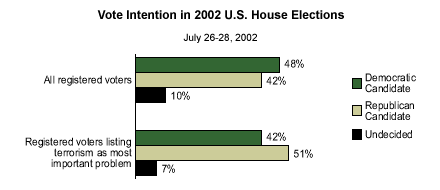Gallup polling this year suggests that the race for control of Congress will be close, though the most recent indications favor the Democratic Party. Between now and the election, both parties have the opportunity to sway voters into their camp in hopes of taking control of the closely divided House of Representatives and Senate. There is little doubt as to which issues will be foremost in Americans' minds as they decide which party's candidates to support. Both terrorism and the economy have swamped all other issues throughout the past year when Gallup has asked Americans to name, without any prompting, the most important problem facing the country. This article, the first in a series that investigates the key issues in the 2002 elections, focuses on terrorism.
A July Gallup poll finds 30% of Americans naming terrorism, national security or fear of war as the most important problem facing the country*. This percentage has declined in recent months, with the economy now becoming a more salient issue to Americans. As recently as June, though, nearly half of Americans cited terrorism as the top challenge facing the United States.

When the question was last asked in a July 26-28 poll, immediately after respondents indicated what they thought was the most important problem, Gallup followed up by asking which political party would be better able to handle it. In the past, this measure has proven to be a strong predictor of voting intention. Overall, Americans are divided on which party would better handle what they feel is the most important problem, with 38% saying the Republican Party and 36% saying the Democratic Party.
Among those citing terrorism as the most important problem, however, Republicans hold a clear advantage. Forty-seven percent of Americans who believe terrorism is the most important problem say the Republican Party would better deal with the issue, significantly more than the 31% who believe the Democratic Party would better handle terrorism. About one in five Americans (22%) who believe terrorism is the most important problem sees no difference between the two parties on the issue.
These results parallel those from an April question that asked Americans to choose which party would better "protect the country from future acts of terrorism." Here, the advantage was even greater for the Republicans, with 54% of Americans saying Republicans would handle the issue better, compared to only 21% who favored Democrats on the issue**. Historically, Americans have given an edge to the Republicans on matters of foreign affairs, military and defense issues, so the extension of this trend to terrorism is no surprise.
The Impact of Terrorism on the Vote
Republicans' ability to benefit electorally from the terrorism issue is evident when analyzing respondents' stated voting intentions for the U.S. House this year. Among all registered voters, 48% say they will vote for the Democratic candidate in their district and 42% say they will vote for the Republican candidate, a six-point edge for the Democrats. However, among registered voters who say terrorism is the most important problem facing the country, 51% say they will vote for the Republican candidate in their district and 42% say they will vote for the Democrat, a nine-point advantage for the Republicans. It should be noted that those who identify themselves as Republicans are more likely to mention terrorism as the most important problem than are self-identified Democrats, so the relationship between the issue of terrorism and the vote may be amplified by the effect of partisanship.

Key Points
To the extent that Republicans can make terrorism the central issue in the 2002 midterm elections, they stand to benefit in their quest to maintain control of the U.S. House and regain control of the Senate. However, as the public increases its focus on the state of the economy, the challenge is becoming greater for the Republican Party.
*These results are based on telephone interviews with a randomly selected national sample of 1,004 adults, aged 18 and older, conducted July 26-28, 2002. For results based on this sample, one can say with 95% confidence that the maximum error attributable to sampling and other random effects is ±3%. In addition to sampling error, question wording and practical difficulties in conducting surveys can introduce error or bias into the findings of public opinion polls.
**These results are based on telephone interviews with a randomly selected national sample of 1,009 adults, aged 18 and older, conducted April 5-7, 2002. For results based on this sample, one can say with 95% confidence that the maximum error attributable to sampling and other random effects is ±3%. In addition to sampling error, question wording and practical difficulties in conducting surveys can introduce error or bias into the findings of public opinion polls.
